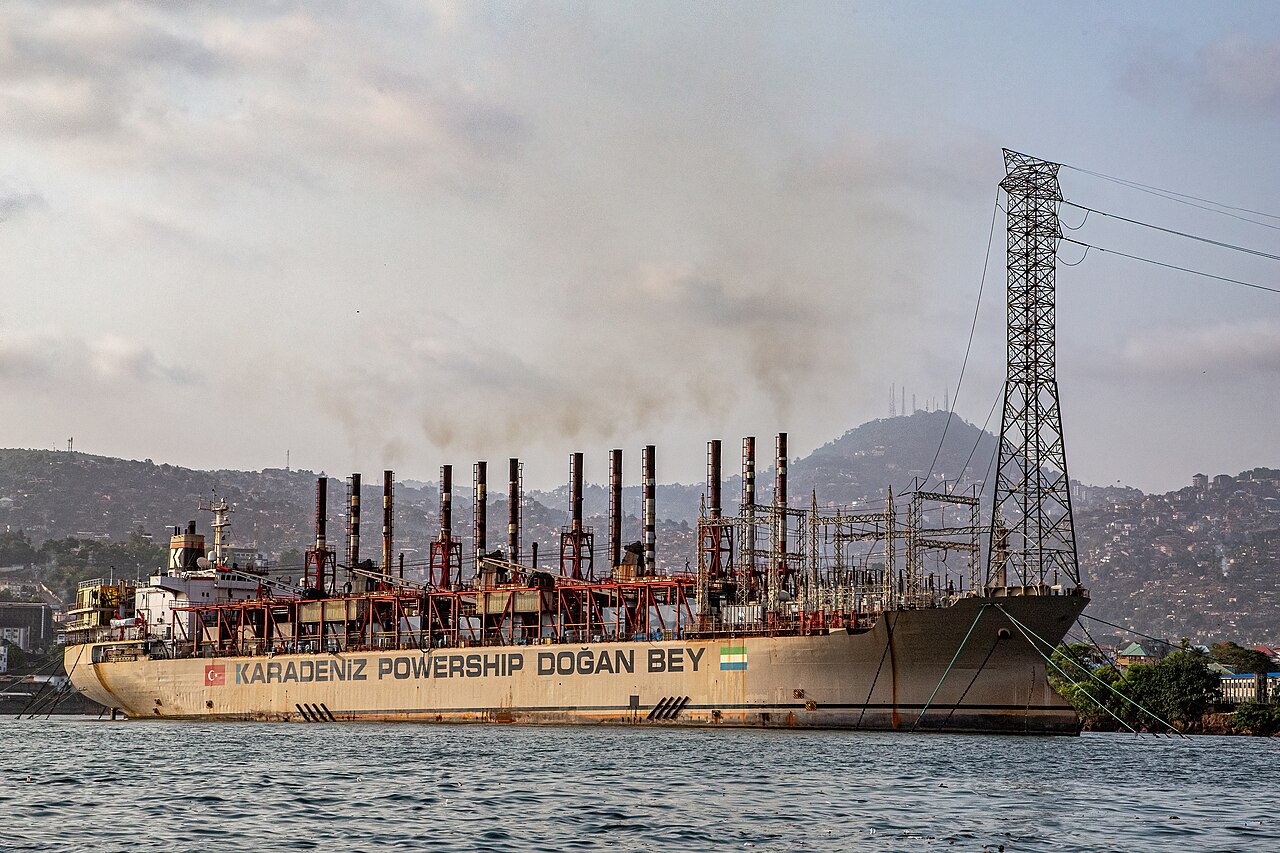The price of plugging in
Floating power plants from Turkey promise to solve blackouts in the Global South. But easy fixes come with political risks.

MV Karadeniz Powership Doğan Bey, Freetown, Sierra Leone. Image credit Adrian Turner via Flickr CC BY-SA 2.0.
When the lights go out in Freetown, Havana, or Rio, salvation can appear on the horizon—though not in the form of future power plants or renewable grids, but as retrofitted ships humming with electricity. These Turkish-owned “Karpowerships” promise to promptly end blackouts. But their convenience and glowing decks belie the complications that come when a nation’s lifeline is precariously tethered to a foreign ship.
In the last two decades, Karpowership (whose parent company is Karadeniz Holding) has emerged as the global leader in building and operating a fleet of powerships which turn heavy fuel oils (HFOs) or liquefied natural gas (LNG) into quickly deployable power across four continents. While the concept of powerships have existed since the 20th century, what makes Karpowership different is its technological modularity and successfully scaled commercialization.
Some commentators have argued that the presence of Karpowership in Africa entrenches dependency and encourages further underinvestment in national energy. The reality is more complicated. Karpowership’s increased presence around the world opens new questions about its installation in fragile or weak states. Karpowership’s value must be based on how a country employs it in its wider development agenda, which involves a host country’s energy mix and political circumstances. Energy policymakers need to be careful in how they procure and handle this tool.
Karpowerships offer a tantalizing, albeit temporary, technological contingent to a nation’s grid. In supplying temporary power, Karpowerships provide for citizens’ basic electricity needs without being embedded into extant networks (besides cables connecting to nearby substations) and without occupying large tracts of land. Contracts can also be negotiated and customized to suit the needs of client states. While some have argued the contracts are exploitative in their take-or-pay provisions, as a private power producer, Karpowership faces political exposure should an incoming administration change the terms of a previously finalized agreement; it is not unexpected that they seek financial assurances beforehand.
Yet many risks undermine the proposed benefits. In addition to charges of alleged corruption, employing Karpowership invariably results in negative ecological impacts from HFOs. Environmental regulation may be especially vulnerable—national-level negotiations may ignore local stakeholders’ concerns, where they might otherwise be considered in traditional power-plant projects involving land use. If the alternative to Karpowerships is intermittent blackouts, then one would have to argue that decentralized pollution from individuals coping with diesel generators does not outweigh the impact from the powership’s emissions. States also face ethical and moral dilemmas when power is cut off in the event of negotiation stalemates or nonpayment. Others have pointed out Karadeniz Holding’s incentive to expand planned contractual timelines in Ghana due to financial and political interests.
To understand why many states in fact utilize temporary infrastructure services, Karpowership’s intermediary value proposition must be framed against the plural complexities and uncertain timescales of ongoing alternative energy transitions in the Global South. A recent study sheds light on several African countries’ approach to Karpowership. The authors argue that temporary contracting of powerships forms one dimension of a multipronged energy transition. Securing financing and establishing new renewable generation projects have long-term time horizons with extensive negotiations, raising the question of solutions for the intermediate term. This, they highlight, is where Karpowership stands out as a power configuration.
For policymakers in Sierra Leone and Gambia, the alternative risks of not providing electricity in the short term overrode the costs of contracting the powership. Whether one argues that electricity in urban settings is a human right or that prolonged outages often lead to social unrest threatening incumbent power, it is clear why policymakers prioritize interim power. Liza Cirolia, Charlotte Ray, and Rifquah Hendricks also incisively discuss energy regulator concerns with maintaining the fiscal integrity of the network. Rolling outages over a long enough period might convince elites to move away from the centralized grid, threatening its long-term coherence with fragmentation. Karpowership as a decentralized technology can act as a short-term buffer, politically deferring any downsides from blackouts while other synchronous plans are implemented.
Other countries’ use of Karpowership will vary based on different national energy mixes, as well as economic and geopolitical contexts. Cuba’s reliance on multiple Karpowerships amidst power shortages forms a portion of its energy mix as it pursues projects to stabilize the national energy grid, including the planned construction of 55 Chinese solar-power parks. Brazil has taken a joint venture approach for LNG and gas projects, while Syria contracts with the firm to recover after civil-war damage to the grid.
How then can states prudently approach Karpowership procurement? They must be careful to resist extending the service indefinitely, even amidst setbacks in national energy goals and renewable infrastructure projects, which rarely progress linearly. It is imperative that state planners carefully perform financial models to assess projected grid development with Karpowership’s usage and associated benefits (e.g., maintained productivity and subsequently earned tax revenue), compared with counterfactual scenarios utilizing other energy sources. The cost per kWh compared to other power sources and public finance management are integral in this process.
As Karpowerships continue to grow globally and seek new market share, we need to be aware of their impact on states’ development agenda and how subscription model infrastructure may erode state sovereignty. This becomes especially important as new innovations in seaborne infrastructure present similar conundrums for states, including offshore data centers in the context of global tech infrastructure and floating desalination plants to aid water shortages.
Karpowership’s motto, “the power of friendship,” rings true—strategic partnerships can create immense value. But not all friendships are permanent, nor are they worth sustaining to begin with. Policymakers must put in the work to determine whether Karpowership is the kind of friend they need.



















